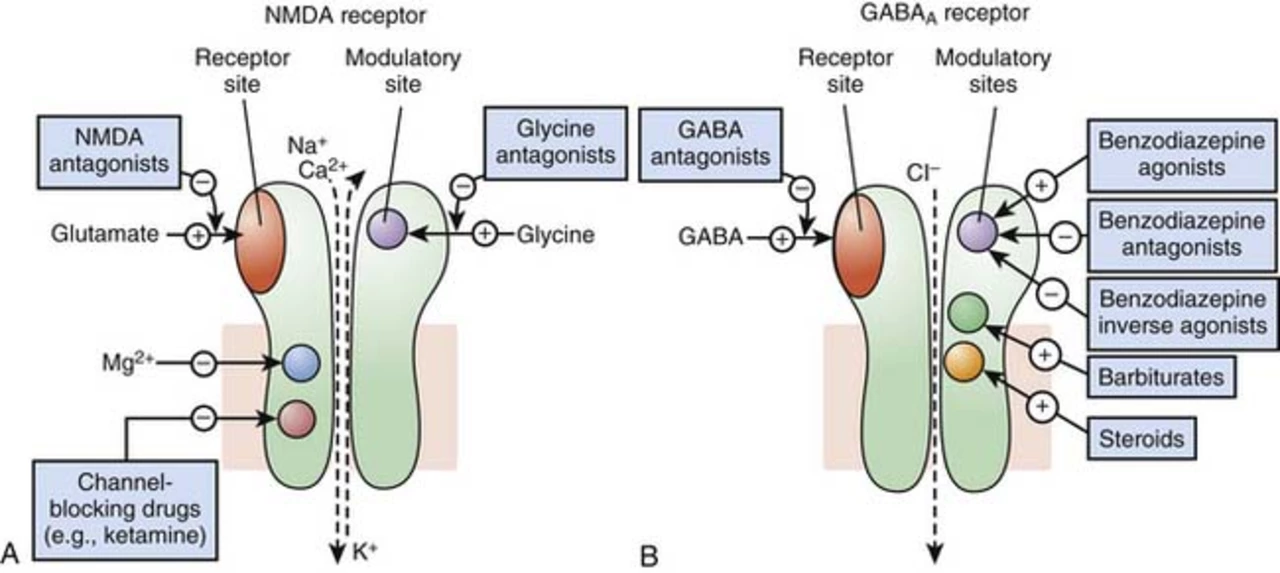
Introduction to Memantine
Memantine is a medication commonly prescribed for the treatment of moderate to severe Alzheimer's disease. It has been shown to be effective in improving cognitive function, memory, and overall quality of life for people with Alzheimer's. In this article, we will explore the mechanism of action of Memantine, which is the way the drug works on a molecular level to produce its therapeutic effects. Gaining a better understanding of how Memantine works can help us appreciate the importance of this medication in the management of Alzheimer's disease.
Memantine's Role in the NMDA Receptor
The primary target of Memantine is the N-methyl-D-aspartate (NMDA) receptor, a type of glutamate receptor found in nerve cells. Glutamate is the primary excitatory neurotransmitter in the brain, responsible for transmitting signals between nerve cells. The NMDA receptor plays a crucial role in learning and memory by regulating the strength of these signals.
In Alzheimer's disease, excessive amounts of glutamate can lead to overstimulation of the NMDA receptor, causing an influx of calcium ions into the nerve cell. This can result in impaired synaptic function and eventual nerve cell death. Memantine's mechanism of action involves blocking excessive activation of the NMDA receptor, thereby protecting nerve cells from damage.
Uncompetitive Antagonism
Memantine is classified as an uncompetitive antagonist, which means that it binds to a different site on the NMDA receptor than the neurotransmitter glutamate. This is an important distinction because it allows Memantine to selectively block over-activated NMDA receptors while sparing normal receptor function. This selective action is crucial in preserving the physiological role of the NMDA receptor in learning and memory while preventing excessive activation that can lead to neuronal damage.
The uncompetitive nature of Memantine also means that it has a voltage-dependent action. This means that the drug only blocks the NMDA receptor when the receptor is in an open state, which typically occurs when the nerve cell is excessively stimulated. This further contributes to Memantine's selective action and its ability to protect nerve cells without disrupting normal function.
Memantine and Neuroprotection
By blocking excessive activation of the NMDA receptor, Memantine has been shown to provide neuroprotective effects. Neuroprotection refers to the preservation of neuronal structure and function, which is vital in the context of neurodegenerative diseases like Alzheimer's. Memantine's neuroprotective properties are thought to be a result of its ability to prevent excitotoxicity, which is the process by which nerve cells are damaged and killed by excessive stimulation.
In addition to preventing excitotoxicity, Memantine may also help to promote the survival of nerve cells by enhancing the function of other neurotransmitter systems, such as the cholinergic system. This system is involved in cognitive processes, and its dysfunction has been implicated in the pathogenesis of Alzheimer's disease.
Improvement of Cognitive Function
One of the main therapeutic effects of Memantine is the improvement of cognitive function in people with Alzheimer's disease. This improvement is thought to be due to the drug's ability to preserve normal synaptic function and protect nerve cells from damage. By preventing excessive activation of the NMDA receptor, Memantine can help to maintain the structural and functional integrity of nerve cells, which is essential for cognitive processes such as learning and memory.
Clinical studies have demonstrated that Memantine can improve cognitive function in people with moderate to severe Alzheimer's disease, as measured by various cognitive tests. These improvements have been shown to be clinically meaningful, resulting in better daily functioning and quality of life for people with Alzheimer's.
Memantine's Role in Slowing Disease Progression
While there is currently no cure for Alzheimer's disease, medications like Memantine can help to slow the progression of the disease. By protecting nerve cells from damage and preserving synaptic function, Memantine may help to delay the decline in cognitive function that is characteristic of Alzheimer's disease. This delay in disease progression can provide valuable time for people with Alzheimer's and their families to make necessary adjustments and plan for the future.
It is important to note that Memantine is not a cure for Alzheimer's disease and cannot reverse the damage that has already been done. However, by slowing the rate of decline, Memantine can help to improve the quality of life for people with Alzheimer's and their caregivers.
Combination Therapy with Other Alzheimer's Medications
Memantine is often used in combination with other Alzheimer's medications, such as cholinesterase inhibitors like donepezil, rivastigmine, or galantamine. These medications work by increasing the levels of acetylcholine, a neurotransmitter involved in cognitive processes. Combining Memantine with a cholinesterase inhibitor can provide additive benefits in improving cognitive function and slowing disease progression.
Studies have shown that the combination of Memantine and a cholinesterase inhibitor can result in greater improvements in cognitive function compared to either medication alone. This combination therapy may be particularly beneficial for people with moderate to severe Alzheimer's disease who require more aggressive treatment to manage their symptoms.
Managing Side Effects of Memantine
Like all medications, Memantine can cause side effects in some people. The most common side effects of Memantine include dizziness, headache, confusion, and constipation. These side effects are generally mild and may improve over time as the body adjusts to the medication. It is important to discuss any concerns about side effects with your healthcare provider, who can help to determine if Memantine is the right treatment option for you or your loved one.
In some cases, adjusting the dose of Memantine or changing the timing of the medication may help to minimize side effects. Your healthcare provider can provide guidance on the appropriate dosing and administration of Memantine to ensure the best possible outcome for managing Alzheimer's disease.
Conclusion
Understanding the mechanism of action of Memantine can provide valuable insight into the way this medication helps to manage Alzheimer's disease. By selectively blocking over-activated NMDA receptors, Memantine protects nerve cells from damage and preserves normal synaptic function. This can result in improvements in cognitive function and a slowing of disease progression, providing valuable benefits for people with Alzheimer's disease and their caregivers. As our understanding of Memantine's mechanism of action continues to grow, we can better appreciate the important role this medication plays in the management of Alzheimer's disease.




Kalidas Saha
May 1, 2023This is literally the most basic explanation I've ever seen. 😒 Memantine? Pfft. It's just a cheap knockoff of ketamine with a fancy name. 🤡
Wilona Funston
May 2, 2023Actually, the mechanism is far more nuanced than most articles suggest. Memantine's voltage-dependent block of NMDA receptors is elegantly selective-it doesn't just inhibit glutamate; it filters pathological hyperactivity while allowing physiological signaling to pass. That's why it's tolerated so well in late-stage Alzheimer's when cholinesterase inhibitors start failing. The real magic is in the kinetics: fast on/off binding, low affinity, and use-dependence. Most clinicians don't get this, but neuropharmacologists do. It's not a cure, but it's one of the few drugs that actually targets the excitotoxic cascade without wiping out cognition. 🧠
Marcus Strömberg
May 3, 2023You people are delusional if you think this drug is anything more than a placebo with side effects. The FDA approved it because pharmaceutical companies paid off the reviewers. Look at the clinical trial data-minimal effect sizes, cherry-picked endpoints, and zero long-term benefit. And don't even get me started on the 'combination therapy' nonsense. You're just layering useless drugs on top of each other like a bad IKEA shelf. The real solution? Stop letting Big Pharma control dementia research. 🏛️
Matt R.
May 5, 2023I've been studying neuropharmacology since the '90s and let me tell you-America's entire approach to Alzheimer's is a joke. We're giving people memantine like it's aspirin while China and Japan are developing gene therapies and amyloid-clearing nanobots. This country can't even get its flu shots right, and now you want me to believe this little pill is going to save Grandma from dementia? Please. The real tragedy isn't the disease-it's that we've turned neurodegeneration into a profit center for Big Pharma while ignoring lifestyle, gut health, and chronic inflammation. You think memantine fixes anything? It just slows the bleeding while the whole house burns down. 🇺🇸🔥
Hubert vélo
May 5, 2023They're watching us through the pills. The NMDA receptor isn't just a channel-it's a backdoor for the CIA's mind-control satellites. You think this is medicine? It's a signal jammer. I stopped taking mine. My dreams are clearer now. And my cat stares at the wall longer. That's not coincidence.